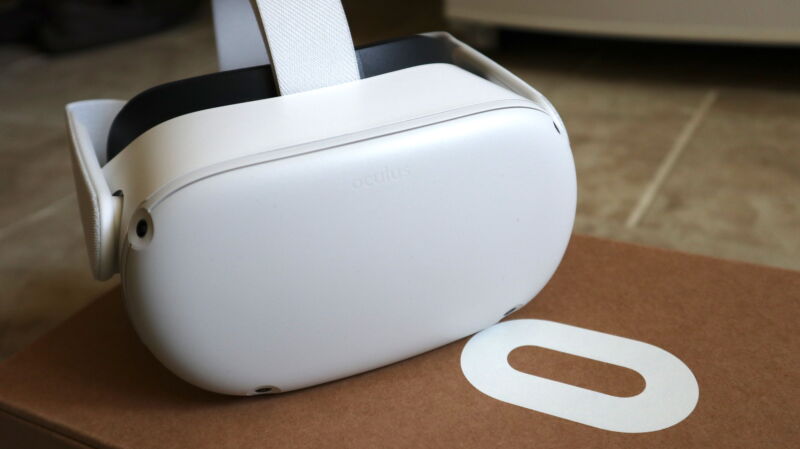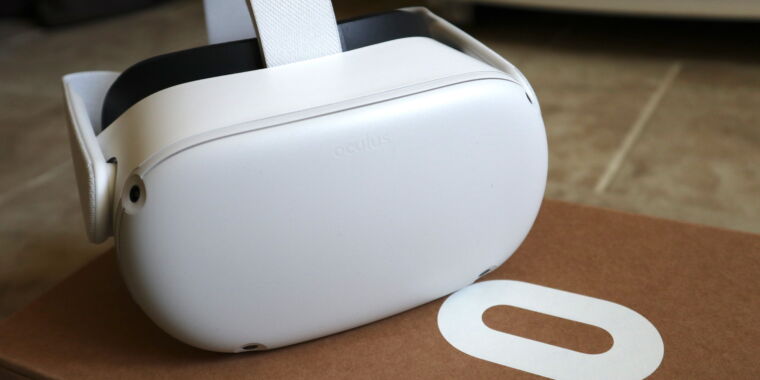Meta removing Facebook login requirement for Quest headsets by next year
[ad_1]

Last year, Facebook started requiring new Oculus Quest users to log in with their personal Facebook accounts rather than a separate Oculus account. Now, in the face of customer backlash and amid Facebook’s metaverse-focused rebranding as Meta, the company says it is “working on” options for Quest users to avoid that login requirement starting next year.
“As we’ve focused more on work, and as we’ve heard feedback from the VR community more broadly, we’re working on new ways to log in to Quest that won’t require a Facebook account, landing sometime next year.” Andrew Bosworth wrote in a Facebook post following yesterday’s Connect keynote. “This is one of our highest priority areas of work internally.”
“I know this is a big deal for a lot of people,” CEO Mark Zuckerberg said during yesterday’s Connect keynote when talking about the coming login change. “Not everyone wants their social media profile linked to all these other experiences. I get that, especially as the metaverse expands. I’ll share more about that later.”
Before those planned changes roll out next year, Meta announced that enterprise users of the Oculus for Business program will be able to log in to Quest using their Work accounts rather than their personal Facebook accounts. Users who had an Oculus account before last September had previously been grandfathered in and could avoid using a Facebook login until 2023.
The whys and hows
In an interview with Stratchery’s Ben Thompson, Zuckerberg added that the backlash to Facebook Login on Quest actually played a big role in Facebook’s overall rebranding decision:
The feedback that we got on that was one of the things that made me actually feel a sense of urgency that we did need to make it so that people had a different brand relationship with the overall company than the Facebook app. Right now, I think that there’s just some confusion where when you sign into Quest with Facebook, are you signing in with the social media app, or are you signing in with your relationship to our company overall?
It was not as clear as it should have been before, and I think because of that, people had some concerns of, “Hey, if I’m signing in with a social media app, does that mean that my data from what I’m doing in VR is somehow going to be connected or is going to show up on Facebook?” or like, “If my Facebook account gets deactivated or I want to stop using that, does that mean my device is going to stop working?” I think that from a brand architecture for the company—that perspective—I think it is just very valuable and useful for people to have a different relationship with the company than with each of the specific apps. It’s sort of why in the same way that you have a Microsoft account or an Apple account that’s different from any of the specific products that you have there. I think that that’s a useful thing in terms of the universe of products that we’re trying to build out.”

It’s worth noting that worries about losing Quest content over wider Facebook account issues were not a theoretical concern; the company confirmed such a thing was possible for egregious policy violations. And it’s not just user backlash Facebook was facing; the company had to pause Oculus headset sales in Germany over regulator concerns that “the obligation to create a Facebook account [to access an Oculus headset] is legally extremely questionable” under the European GDPR’s “coupling ban.”
Regardless of the underlying reasons, a lot will depend on the specific shape of the new “Facebook-free” login requirements that the company comes up with. Is the removal of a Facebook account requirement just a prelude to the rollout of a separate Meta account, for instance? That would align broadly with the company’s planned “shifting away from the Oculus brand” and toward a rebranded “Meta Quest” in early 2022. If that’s the case, how much data (if any) would be shared between a Facebook account and a Meta account linked under the same umbrella?
We also wonder if users will be able to use external accounts (i.e., a Google or OAuth account) to identify themselves on the headset. Can Quest users stay anonymous or use pseudonyms when interacting with Meta’s planned metaverse? And how much access will be available to users who want to skip the login and simply sideload their own content without any connection to the online ecosystem?
The answers to these and other logistical questions will be crucial to the wider reception for the upcoming login change. So while it’s nice to see Meta belatedly responding to the backlash over this issue, we’ll reserve final judgment until more details are released in the coming months.
Listing image by Sam Machkovech
[ad_2]
Source link




